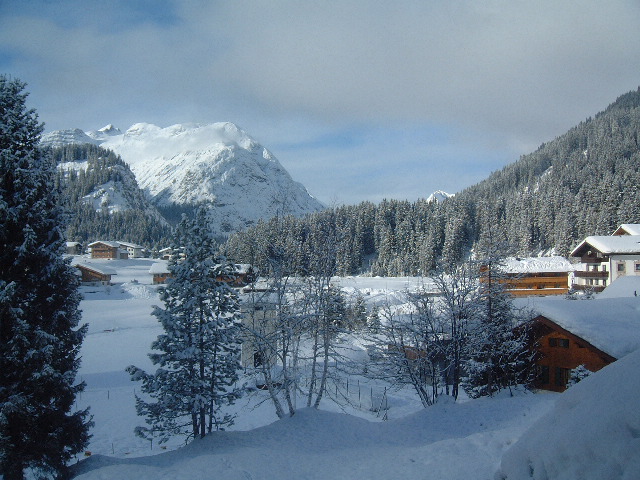
This article from the Washington Post I think sums it all up!
Global Warming's Real Inconvenient Truth
By Robert J. SamuelsonWednesday, July 5, 2006; Page A13
"Global warming may or may not be the great environmental crisis of the next century, but -- regardless of whether it is or isn't -- we won't do much about it. We will (I am sure) argue ferociously over it and may even, as a nation, make some fairly solemn-sounding commitments to avoid it. But the more dramatic and meaningful these commitments seem, the less likely they are to be observed. Little will be done. . . . Global warming promises to become a gushing source of national hypocrisy.''
-- This column, July 1997
Well, so it has. In three decades of columns, I've never quoted myself at length, but here it's necessary. Al Gore calls global warming an "inconvenient truth," as if merely recognizing it could put us on a path to a solution. That's an illusion. The real truth is that we don't know enough to relieve global warming, and -- barring major technological breakthroughs -- we can't do much about it. This was obvious nine years ago; it's still obvious. Let me explain.
From 2003 to 2050, the world's population is projected to grow from 6.4 billion people to 9.1 billion, a 42 percent increase. If energy use per person and technology remain the same, total energy use and greenhouse gas emissions (mainly, carbon dioxide) will be 42 percent higher in 2050. But that's too low, because societies that grow richer use more energy. Unless we condemn the world's poor to their present poverty -- and freeze everyone else's living standards -- we need economic growth. With modest growth, energy use and greenhouse emissions more than double by 2050.
Just keeping annual greenhouse gas emissions constant means that the world must somehow offset these huge increases. There are two ways: Improve energy efficiency, or shift to energy sources with lower (or no) greenhouse emissions. Intuitively, you sense this is tough. China, for example, builds about one coal-fired power plant a week. Now a new report from the International Energy Agency in Paris shows all the difficulties (the population, economic growth and energy projections cited above come from the report).
The IEA report assumes that existing technologies are rapidly improved and deployed. Vehicle fuel efficiency increases by 40 percent. In electricity generation, the share for coal (the fuel with the most greenhouse gases) shrinks from about 40 percent to about 25 percent -- and much carbon dioxide is captured before going into the atmosphere. Little is captured today. Nuclear energy increases. So do "renewables" (wind, solar, biomass, geothermal); their share of global electricity output rises from 2 percent now to about 15 percent.
Some of these changes seem heroic. They would require tough government regulation, continued technological gains and public acceptance of higher fuel prices. Never mind. Having postulated a crash energy diet, the IEA simulates five scenarios with differing rates of technological change. In each, greenhouse emissions in 2050 are higher than today. The increases vary from 6 percent to 27 percent.
Since 1800 there's been modest global warming. I'm unqualified to judge between those scientists (the majority) who blame man-made greenhouse gases and those (a small minority) who finger natural variations in the global weather system. But if the majority are correct, the IEA report indicates we're now powerless. We can't end annual greenhouse emissions, and once in the atmosphere, the gases seem to linger for decades. So concentration levels rise. They're the villains; they presumably trap the world's heat. They're already about 36 percent higher than in 1800. Even with its program, the IEA says another 45 percent rise may be unavoidable. How much warming this might create is uncertain; so are the consequences.
I draw two conclusions -- one political, one practical.
No government will adopt the draconian restrictions on economic growth and personal freedom (limits on electricity usage, driving and travel) that might curb global warming. Still, politicians want to show they're "doing something." The result is grandstanding. Consider the Kyoto Protocol. It allowed countries that joined to castigate those that didn't. But it hasn't reduced carbon dioxide emissions (up about 25 percent since 1990), and many signatories didn't adopt tough enough policies to hit their 2008-2012 targets. By some estimates, Europe may overshoot by 15 percent and Japan by 25 percent.
Ambitious U.S. politicians also practice this self-serving hypocrisy. Gov. Arnold Schwarzenegger has a global warming program. Gore counts 221 cities that have "ratified" Kyoto. Some pledge to curb their greenhouse emissions. None of these programs will reduce global warming. They're public relations exercises and -- if they impose costs -- are undesirable. (Note: on national security grounds, I favor taxing oil, but the global warming effect would be trivial.) The practical conclusion is that if global warming is a potential calamity, the only salvation is new technology. I once received an e-mail from an engineer. Thorium, he said. I had never heard of thorium. It is, he argued, a nuclear fuel that is more plentiful and safer than uranium without waste disposal problems. It's an exit from the global warming trap. After reading many articles, I gave up trying to decide whether he is correct. But his larger point is correct: Only an aggressive research and development program might find ways of breaking our dependence on fossil fuels or dealing with it. Perhaps some system could purge the atmosphere of surplus greenhouse gases?
The trouble with the global warming debate is that it has become a moral crusade when it's really an engineering problem. The inconvenient truth is that if we don't solve the engineering problem, we're helpless.
Global Warming's Real Inconvenient Truth
By Robert J. SamuelsonWednesday, July 5, 2006; Page A13
"Global warming may or may not be the great environmental crisis of the next century, but -- regardless of whether it is or isn't -- we won't do much about it. We will (I am sure) argue ferociously over it and may even, as a nation, make some fairly solemn-sounding commitments to avoid it. But the more dramatic and meaningful these commitments seem, the less likely they are to be observed. Little will be done. . . . Global warming promises to become a gushing source of national hypocrisy.''
-- This column, July 1997
Well, so it has. In three decades of columns, I've never quoted myself at length, but here it's necessary. Al Gore calls global warming an "inconvenient truth," as if merely recognizing it could put us on a path to a solution. That's an illusion. The real truth is that we don't know enough to relieve global warming, and -- barring major technological breakthroughs -- we can't do much about it. This was obvious nine years ago; it's still obvious. Let me explain.
From 2003 to 2050, the world's population is projected to grow from 6.4 billion people to 9.1 billion, a 42 percent increase. If energy use per person and technology remain the same, total energy use and greenhouse gas emissions (mainly, carbon dioxide) will be 42 percent higher in 2050. But that's too low, because societies that grow richer use more energy. Unless we condemn the world's poor to their present poverty -- and freeze everyone else's living standards -- we need economic growth. With modest growth, energy use and greenhouse emissions more than double by 2050.
Just keeping annual greenhouse gas emissions constant means that the world must somehow offset these huge increases. There are two ways: Improve energy efficiency, or shift to energy sources with lower (or no) greenhouse emissions. Intuitively, you sense this is tough. China, for example, builds about one coal-fired power plant a week. Now a new report from the International Energy Agency in Paris shows all the difficulties (the population, economic growth and energy projections cited above come from the report).
The IEA report assumes that existing technologies are rapidly improved and deployed. Vehicle fuel efficiency increases by 40 percent. In electricity generation, the share for coal (the fuel with the most greenhouse gases) shrinks from about 40 percent to about 25 percent -- and much carbon dioxide is captured before going into the atmosphere. Little is captured today. Nuclear energy increases. So do "renewables" (wind, solar, biomass, geothermal); their share of global electricity output rises from 2 percent now to about 15 percent.
Some of these changes seem heroic. They would require tough government regulation, continued technological gains and public acceptance of higher fuel prices. Never mind. Having postulated a crash energy diet, the IEA simulates five scenarios with differing rates of technological change. In each, greenhouse emissions in 2050 are higher than today. The increases vary from 6 percent to 27 percent.
Since 1800 there's been modest global warming. I'm unqualified to judge between those scientists (the majority) who blame man-made greenhouse gases and those (a small minority) who finger natural variations in the global weather system. But if the majority are correct, the IEA report indicates we're now powerless. We can't end annual greenhouse emissions, and once in the atmosphere, the gases seem to linger for decades. So concentration levels rise. They're the villains; they presumably trap the world's heat. They're already about 36 percent higher than in 1800. Even with its program, the IEA says another 45 percent rise may be unavoidable. How much warming this might create is uncertain; so are the consequences.
I draw two conclusions -- one political, one practical.
No government will adopt the draconian restrictions on economic growth and personal freedom (limits on electricity usage, driving and travel) that might curb global warming. Still, politicians want to show they're "doing something." The result is grandstanding. Consider the Kyoto Protocol. It allowed countries that joined to castigate those that didn't. But it hasn't reduced carbon dioxide emissions (up about 25 percent since 1990), and many signatories didn't adopt tough enough policies to hit their 2008-2012 targets. By some estimates, Europe may overshoot by 15 percent and Japan by 25 percent.
Ambitious U.S. politicians also practice this self-serving hypocrisy. Gov. Arnold Schwarzenegger has a global warming program. Gore counts 221 cities that have "ratified" Kyoto. Some pledge to curb their greenhouse emissions. None of these programs will reduce global warming. They're public relations exercises and -- if they impose costs -- are undesirable. (Note: on national security grounds, I favor taxing oil, but the global warming effect would be trivial.) The practical conclusion is that if global warming is a potential calamity, the only salvation is new technology. I once received an e-mail from an engineer. Thorium, he said. I had never heard of thorium. It is, he argued, a nuclear fuel that is more plentiful and safer than uranium without waste disposal problems. It's an exit from the global warming trap. After reading many articles, I gave up trying to decide whether he is correct. But his larger point is correct: Only an aggressive research and development program might find ways of breaking our dependence on fossil fuels or dealing with it. Perhaps some system could purge the atmosphere of surplus greenhouse gases?
The trouble with the global warming debate is that it has become a moral crusade when it's really an engineering problem. The inconvenient truth is that if we don't solve the engineering problem, we're helpless.


